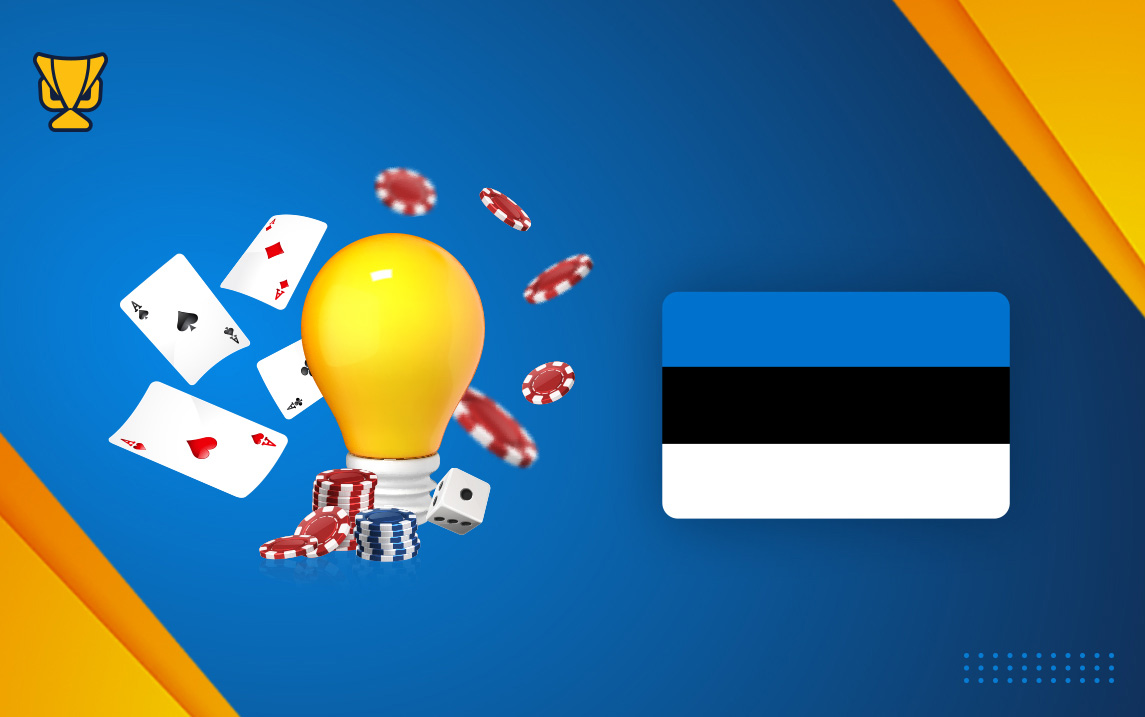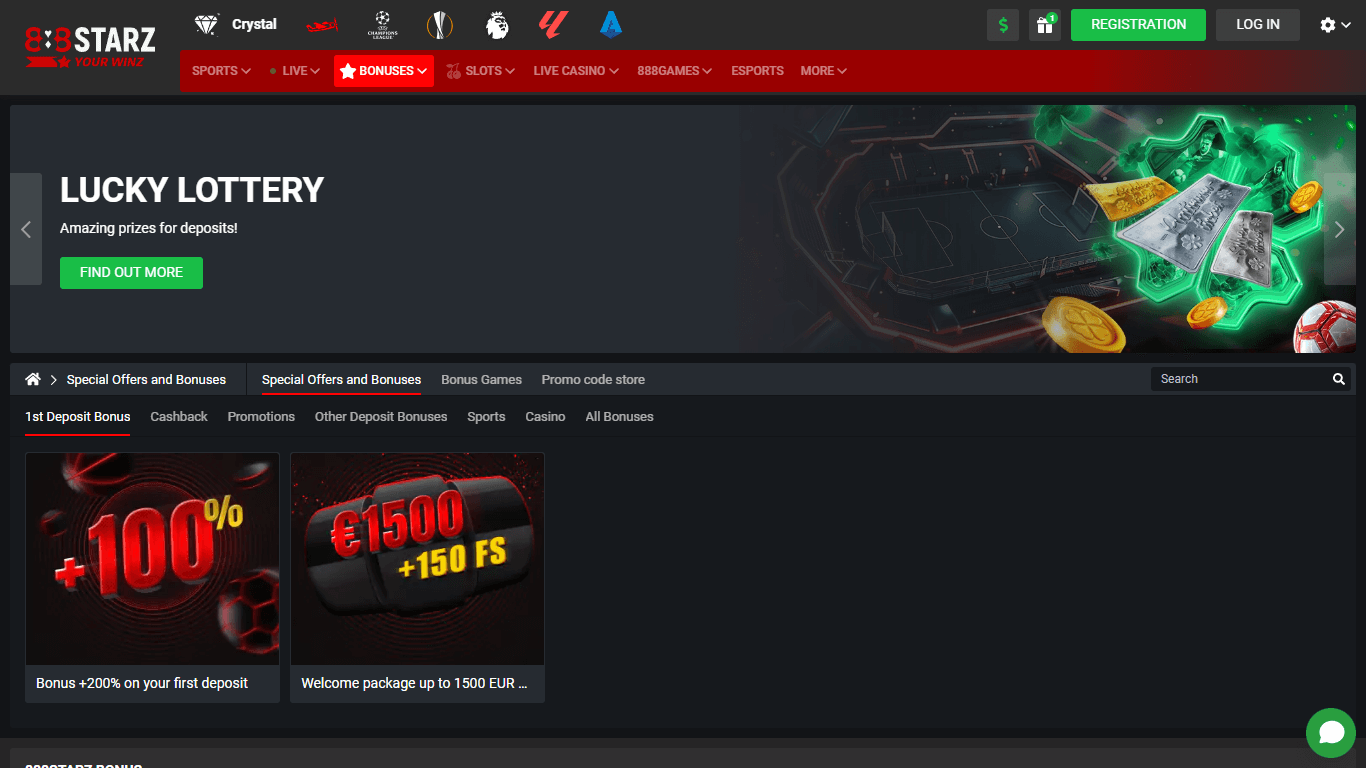Best Online Casinos Estonia
⏲️ Reading time: 23 minutes


In Estonia, online casino sites have emerged as a popular alternative to traditional sports gambling, offering a unique and convenient gaming experience. These digital platforms, regulated under Estonia's clear legal framework, provide various games and advanced features, catering to a growing audience seeking varied and accessible gambling options. This modern form of entertainment underscores Estonia's progressive stance in the digital gambling arena.
| Rank | Casino | Rating | Bonus | Get bonus |
|---|---|---|---|---|
| 1 |  1GoCasino | 4.5/5 | 150% deposit bonus of up to 300 EUR | Read review |
| 2 |  Monro Casino | 4.5/5 | 100% Welcome Bonus up to EUR 600 | Read review |
| 3 |  Legzo Casino | 4.8/5 | 100% first deposit bonus up to €600 + 500 free spins | Read review |
| 4 | Drip Casino | 4.5/5 | Welcome bonus 150% up to €600 | Read review |
| 5 |  Megapari | 4.8/5 | 100% welcome bonus up to 290 EUR | Read review |
This article will tell you everything you need to know about where you can play the best online casino games in Estonia.

The votes are in. Before you get started reading the review, take a quick look at the five casinos that our experts think are the best of the best:
Where will you start your own gaming journey?
Mobile casinos in Estonia are regulated under a robust legal framework to ensure fair and responsible gambling. The key legislation governing this sector is the Gambling Act 2008, which modernized the regulatory approach, particularly for the online gambling industry.
This act requires operators to obtain an activity license and an operation permit, ensuring compliance with legal and financial standards. The Estonian Tax and Customs Board is responsible for issuing these licenses and overseeing the gambling industry.
Even those licensed in other EU countries, operators must meet Estonia's stringent requirements, including demonstrating financial stability and responsible business practices.
Estonia's approach balances promoting a competitive gambling market with strong consumer protection measures, reflecting its commitment to a well-regulated and safe online gambling environment.
| Aspect | Details in Estonia |
|---|---|
| 🌍 Country | Estonia |
| 👌 Language | Estonian |
| 💲 Currency | Euro (EUR) |
| 🎰 Popular Casino Games | Slot machines, Poker, Blackjack, Roulette, and Baccarat |
| ⚖️ Is Gambling Legal? | Yes, online gambling is legal but heavily regulated. |
| 🏢 Gambling Regulator | Estonian Tax and Customs Board |
| 🧾 Gambling Tax | Varies by type of gambling; e.g., €300 per gaming machine for games of chance, €1,278.23 per gaming table, 18% of the amount received from the sale of lottery tickets |
| 💳 Popular Payment Methods | E-Wallets (Skrill, Neteller), Cards (Visa), Prepaid Cards (Paysafecard), Bank Transfers |
Introducing the top 5 online casinos in Estonia, these platforms have gained recognition for their exceptional gaming experiences and diverse offerings. This section will review Estonia's top 5 online casinos. Each entity boasts a treasure trove of exclusive games and features. Read on as we explore their unique features.


In the Estonian casino industry, GGBet is recognized for its comprehensive range of virtual casino games, appealing particularly to players interested in a diverse gaming experience.
| Features | Descriptions |
|---|---|
| 🎁 Welcome Bonus | Up to €200 + 25 Free Spins |
| 🎰 Popular Casino Games | Slots, Roulette, Blackjack, Baccarat, Poker |
| ⭐️ Suppliers | Microgaming, NetEnt, Play’n GO, Pragmatic Play, Evolution Gaming |
| 💳 Payment Methods | VISA, Mastercard, Maestro, Skrill, Neteller, PayPal, Paysafecard |
| 💵 Minimum Deposit | €5 |
| 💬 Customer Support | 24/7 Live Chat, Email, Phone |


Starda has carved a niche in Estonia's casino market with its user-friendly interface and a strong focus on slots and traditional casino games.
| Features | Descriptions |
|---|---|
| 🎁 Welcome Bonus | 100% up to €300 |
| 🎰 Popular Casino Games | Slots, Roulette, Blackjack, Baccarat, Poker |
| ⭐️ Suppliers | EGT, Novomatic, Playtech, Evolution Gaming |
| 💳 Payment Methods | VISA, Mastercard, Maestro, Skrill, Neteller, Trustly, Paysafecard |
| 💵 Minimum Deposit | €10 |
| 💬 Customer Support | 24/7 Live Chat, Email, Phone |


1xBet is famous for its extensive casino game selection. It has become popular among Estonian players for its live casino options and variety of slots.
| Features | Descriptions |
|---|---|
| 🎁 Welcome Bonus | 100% up to €100 |
| 🎰 Popular Casino Games | Slots, Roulette, Blackjack, Baccarat, Poker |
| ⭐️ Suppliers | Microgaming, NetEnt, Playtech, Evolution Gaming, Pragmatic Play |
| 💳 Payment Methods | VISA, Mastercard, Maestro, Skrill, Neteller, PayPal, Bitcoin, Paysafecard |
| 💵 Minimum Deposit | €1 |
| 💬 Customer Support | 24/7 Live Chat, Email, Phone |


VulkanBet stands out in the Estonian casino landscape for its immersive gaming experience, a wide array of video slots, and classic table games.
| Features | Descriptions |
|---|---|
| 🎁 Welcome Bonus | 100% up to €200 |
| 🎰 Popular Casino Games | Slots, Roulette, Blackjack, Baccarat, Poker |
| ⭐️ Suppliers | NetEnt, Playtech, EGT, Evolution Gaming, Pragmatic Play |
| 💳 Payment Methods | VISA, Mastercard, Maestro, Skrill, Neteller, Trustly, Paysafecard |
| 💵 Minimum Deposit | €10 |
| 💬 Customer Support | 24/7 Live Chat, Email, Phone |


In Estonia, 888Starz is renowned for its innovative approach to online casinos, offering a unique blend of traditional and modern games and reliable customer support.
| Features | Descriptions |
|---|---|
| 🎁 Welcome Bonus | 100% up to €100 |
| 🎰 Popular Casino Games | Slots, Roulette, Blackjack, Baccarat, Poker |
| ⭐️ Suppliers | Microgaming, NetEnt, Playtech, Evolution Gaming, Pragmatic Play |
| 💳 Payment Methods | VISA, Mastercard, Maestro, Skrill, Neteller, PayPal, Bitcoin, Paysafecard |
| 💵 Minimum Deposit | €10 |
| 💬 Customer Support | 24/7 Live Chat, Email, Phone |
In the vibrant world of Estonian casinos, making the right choice is paramount. In this comprehensive comparison, we'll break down the finest casinos in Estonia, helping you navigate your way to an exceptional gaming experience.
| Casino | Welcome Bonus | Games Available | Live Games | Minimum Deposit | Withdrawal Time |
|---|---|---|---|---|---|
 | Up to €200 + 25 Free Spins | Slots, Roulette, Blackjack, Baccarat, Poker | Yes | €5 | Up to 24 hours |
 | 100% up to €300 | Slots, Roulette, Blackjack, Baccarat, Poker | Yes | €10 | Up to 24 hours |
 | 100% up to €100 | Slots, Roulette, Blackjack, Baccarat, Poker | Yes | €1 | Up to 24 hours |
 | 100% up to €200 | Slots, Roulette, Blackjack, Baccarat, Poker | Yes | €10 | Up to 24 hours |
 | 100% up to €100 | Slots, Roulette, Blackjack, Baccarat, Poker | Yes | €10 | Up to 24 hours |
Our experts assess every online casino using a number of important criteria. In order to guarantee that you have a secure and top-notch gaming experience, we make sure that every platform meets our high standards. To learn more about the standards we use for reviews, read on.
When looking for an online casino in Estonia, be sure it has a recognized license. Because they are risking their own money, gamers want guarantees that the casino is honest and open. Reliable payouts and player protection are guaranteed by licensed casinos.
Due to the nature of any online casino, we give preference to platforms that have SSL encryption and have received good reviews from players. For the peace of mind of their members, the online casinos that are mentioned here have demonstrated their integrity and maintain solid security measures.
We give a lot of weight to evaluations that highlight generous bonuses, especially for new players. You may get more out of your gaming experience, enjoy it for longer, and save money with attractive promos. For the benefit of our readers, we compare the bonus offers of all the casinos.
A diverse and ever-changing experience is guaranteed by a sizable game collection. With a wide variety of titles to choose from, including slots and table games, players can try their hand at different tactics, which keeps things interesting and could lead to more wins.
We take into account the availability of many payment methods when making our assessments. With a variety of options, including eWallets, credit cards, and bank transfers, players may choose the one that suits them most, guaranteeing that deposits and withdrawals will go smoothly.
Particularly for newcomers, top-notch assistance is crucial. To ensure that you have access to fast, experienced help anytime you need it, our specialists evaluate the quality of support services, including the operating hours and contact options.
If you want to start gambling at Estonian online casinos, it’s pretty easy to do. Follow the steps we have outlined below, and you’ll be off to a running start:
And always wager within your means. Be sure you know the ins and outs of Estonian online betting legislation and stick to your budget.
There are plenty of things to consider when looking at the question of online and offline casinos. Each has its strengths and weaknesses. Which should you choose? Everything you need to know is right here:
| Aspect | Online Casinos | Land-Based Casinos |
|---|---|---|
| ✅ Convenience | Accessible from anywhere 24/7 | Limited by location and open hours |
| 🎰 Game Variety | Wide selection, regularly updated | Limited by physical space |
| 🎁 Bonuses | Welcome bonuses, promotions, and loyalty programs | Occasional promotions, but usually less frequent |
| 💰 Minimum Bets | Typically lower, ideal for casual players | Often higher, suited for committed bettors |
| 👥 Social Experience | Minimal social interaction; live chats available in some games | High social interaction with live dealers and other players |
| 💶 Cashouts | Can take a few days, depending on the payment methods | Immediate cashouts available |
| 📱 Atmosphere | Lacks physical casino ambiance | Unique casino atmosphere with sights and sounds |
| 🛑 Accessibility Risk | Easy to access, can encourage problem gambling | Restricted access, lower risk of impulsive gambling |
| 🔧 Technical Issues | Potential for internet disruptions or technical glitches | Generally stable, with fewer technical interruptions |
| 🪙 Costs | None beyond gambling funds; can play from home | Travel, food, and potentially lodging costs |





Estonian online casinos provide a variety of incentives to entice new customers and reward regulars. Extras like cashback discounts, free spins, and welcome packages make it easier to play and give you a better chance of winning. Take advantage of these tempting promotions designed only for players in Estonia and get more out of your wagers!
For new players in Estonia, the welcome bonus is the ideal way to start. This incentive is received when registering at the casino. To get a welcome bonus, all you have to do is create an account and then make a deposit. Some casinos offer you a 100% match up to a certain amount! You may enjoy a longer time playing your favorite games with the additional dollars provided by this signup bonus, which can double or even triple your initial investment. You can try out all the games and services the casino has to offer with a larger bankroll.
When you make your first payment, you’ll be eligible for a bonus. You may get your hands on the bonus cash by signing up for an account at an Estonian online casino, making a qualifying deposit, and then cashing out. This allows you to get back a certain percentage in return based on the size of your first deposit. You may play more games and improve your odds of winning with this incentive because it boosts your betting power.
Free spins are unique–they let you have a few free turns at a slot. How do you acquire them? They are usually part of the welcome bonus–get that, and you’ll get free spins credited to you automatically! The vast majority of online casinos include wagering requirements for free spins, which means you have to play through your winnings from those spins before you can cash them out. To allow you to get your hands on the cash as soon as your free spins end, some casinos offer them with no wagering requirements.
When you’re on a losing streak, a cashback bonus might help ease the pain by giving you back a portion of your losses. Usually, they are available on a particular day, though different casinos may have different conditions.
Benefits, such as free spins or other awards, are determined by player level and the length of time spent playing games. Often, these are exclusive to high-spending casino patrons. Members of the VIP program at Estonian online casinos are eligible for exclusive benefits such as increased cashback rates, unique bonuses, and dedicated account managers. As you progress through the VIP levels, you’ll be rewarded with better care and a more tailored gaming experience.

In 1 Estonian Kroon casinos, diverse payment methods are essential for catering to players' varied preferences and requirements, enhancing accessibility and user experience. This variety ensures convenience, as players can select the most suitable option, whether it's e-wallets for speed, credit/debit cards for familiarity, or crypto casinos for added privacy and security.
Additionally, diverse payment options are pivotal for inclusivity, accommodating players who might not have access to traditional banking services. Instant withdrawal casinos and minimum deposit casinos in Estonia are best for new casino users.
They also facilitate international transactions, making cross-border payments more efficient. The range of payment methods in Estonian online casinos is crucial in providing a secure, convenient, and inclusive environment for all players.





| Payment Options | Deposit Time | Withdrawal Time | Deposit Limits (€) | Withdrawal Limits (€) | Supported Casinos |
|---|---|---|---|---|---|
| Visa | Instant | 1-5 business days | €10,000 | €25,000 | Widely supported |
| PayPal | Instant | 1-3 business days | €5,000 | €10,000 | Widely supported |
| Bank Transfer | 1-5 business days | 3-7 business days | No limit | No limit | Most casinos |
| Paysafecard | Instant | Not applicable | €250 | €250 | Limited support |
| Boku | Instant | Not applicable | €50 | €50 | Limited support |
| Cryptocurrencies | Instant | 1-3 business days | Varies | Varies | Limited support |
Players in Estonia can play any casino game they want at any online casino. Slot machines, blackjack, roulette, baccarat, and live dealer options are just a few of the games offered by Estonian sites. Whether you like old favorites or the latest releases, you’ll find everything you’re looking for, plus more.
Online slots are easy and fun to play. Many different kinds exist, including:
You win by matching winning symbols in a precise order. Slot games are exciting and strategic, and variations add extra elements like bonus rounds, multipliers, and wild symbols. Slot machines provide enjoyable, accessible amusement for players of all skill levels.
The goal of a hand of blackjack is to obtain a hand as near to 21 as possible without going over. It’s popular because it gives you the biggest chance of winning. Each player is dealt two cards, and the dealer also gets two, one face-up. Number cards are worth their face value, face cards are worth 10, and an Ace can be worth 1 or 11. You can choose to “hit” (take another card), “stand” (keep your total), “double down,” or “split,” depending on the hand. Card counting is a strategy that tracks high and low cards to predict the odds of the next card being beneficial. Counting cards is legal but is frowned upon by casinos, and the casino may ban players who are suspected of it.
Players wager on the possible landing spots of a spinning ball on a roulette wheel. Colors, ranges of numbers, or specific numbers can all be bet on. European, American, and French roulette are three variations that offer a touch of variety to every spin. These variations range somewhat in wheel layout and betting options.
Baccarat is a classic game of strategy and elegance in which participants wager on which hand—the player’s or the banker’s—will come closest to nine. This traditional casino game is taken to the next level with variants such as Punto Banco, Chemin de Fer, and Baccarat Banque, each of which brings its own set of rules and techniques to the table.
Video poker is a hybrid game that blends poker with slot machines. Some popular variations with their own distinctive twists are Joker Poker, Deuces Wild, and Jacks or Better. Every player, regardless of experience, may find a game that suits their style and requires a combination of skill and chance to win.
With almost every gambling platform in Estonia offering a mobile-friendly version, mobile casinos provide a simple method to play games while on the move. You may use these platforms on your iPhone or Android mobile device, and they are designed to be fast and efficient. Players have a plethora of options because most slot machines and table games are mobile-friendly and include all popular titles. To avoid choppy gameplay, slow loading times, and device incompatibility, Estonian casinos have switched to HTML5 technology from the antiquated Flash plugin. Mobile casinos in Estonia offer a smooth and engaging gaming experience regardless of where you are.
It comes as no surprise that you can play anywhere, anytime, but how can you know which sites to trust completely? We have compiled a list of the apps that we think you should download right now.
A fascinating combination of online and land-based gambling, a live casino gives players the opportunity to play games in real time with actual dealers and genuine casino tables. Fans of table games like blackjack, roulette, and baccarat can now enjoy these classics from the convenience of their own homes thanks to high-definition streaming. The ability to simulate a real-life casino setting without leaving your house is a major selling point of live dealer platforms. Ideal for players looking for an immersive and realistic gaming experience features like HD streaming and real-time chat create a communal atmosphere.
Want to try something new? Check out these casinos:
All these offerings are suitably licensed. You will find everything you need from them.
The Estonian online casino industry is experiencing significant growth, largely thanks to its progressive regulatory framework overseen by the Estonian Tax and Customs Board. This ensures transparent and fair operations in the sector.
Despite being modest compared to global markets, Estonia’s market is steadily growing, with online real money casinos gaining popularity, convenience, and various offerings, such as slots, poker, and sports betting.
In the future, Estonia’s online casino sector is poised for further expansion. Opportunities lie in adopting advanced technologies like virtual reality and blockchain, which could revolutionize the gaming experience.
Estonia’s tech-savvy culture and centralized regulatory approach make it an ideal candidate for leading free game casino innovations in this space. The potential for tapping into the international market through multilingual platforms, diverse payment methods, and partnerships with global operators also presents promising avenues for growth.


Online casino winnings are never certain, but new players can increase their chances and have fun with the right strategy. For a head start, here are some crucial pieces of advice.
In order to have fun and stay secure while playing at online casinos, newcomers should follow these suggestions.
Gambling addiction in Estonia is a significant issue, with the country experiencing problem gambling rates above the average of 3% or even more, aligning with other European countries such as Finland and Switzerland.
A directive has been signed by the Estonian Ministry of Social Affairs to combat and alleviate problem gambling, providing €200,000 to the MTÜ Gambling Addiction Counselling Centre. This initiative aims to offer comprehensive help and support to individuals acknowledging their gambling problems and their families.
The funding will allow for free psychological counseling for around 200 problem gamers and debt counseling for about half that number. The ministry highlights the particular concern regarding gambling among minors and the cascading effects of gambling-related debts.
For those seeking help for addiction to casinos in Estonia without verification, there is a dedicated hotline available for gambling problems.
This hotline offers free and confidential support, and the volunteers are well-trained in supporting individuals with gambling issues.
Counselors provide a non-judgmental, compassionate listening ear, aiming to help people recover from the impacts of their gambling behavior. They address various aspects of gambling addiction, such as the inability to stop gambling despite adverse consequences, financial troubles due to gambling, and the use of gambling as a coping mechanism for other problems.
Estonia is a prominent hub for online casinos, offering a well-regulated gaming market that ensures player protection and fair play. Essential considerations for Estonian players choosing an online casino include various popular casino bonuses like no deposit bonus casino and diverse payment methods. When selecting an online casino, Estonian players should also consider security, game selection, and quality of customer support offered.
Online gambling operates smoothly in Estonia under clearly defined regulations. Players must register at a licensed online casino, deposit money, and enjoy various free spins casino games, with all primary payment methods accepting Euros.
Estonian online casinos offer classic games like poker, blackjack, roulette, baccarat, and a wide range of slot machines from top global software providers.
Yes, online gambling is legal and heavily regulated in Estonia. Companies can operate online casinos if they obtain a license through the Estonian Tax and Customs Board.
Estonia has 49 legal gambling establishments across ten cities, including slots, parlors, and poker rooms. Online, around 25 operators are licensed, with each running multiple sites, making the exact number of online casinos hard to measure.